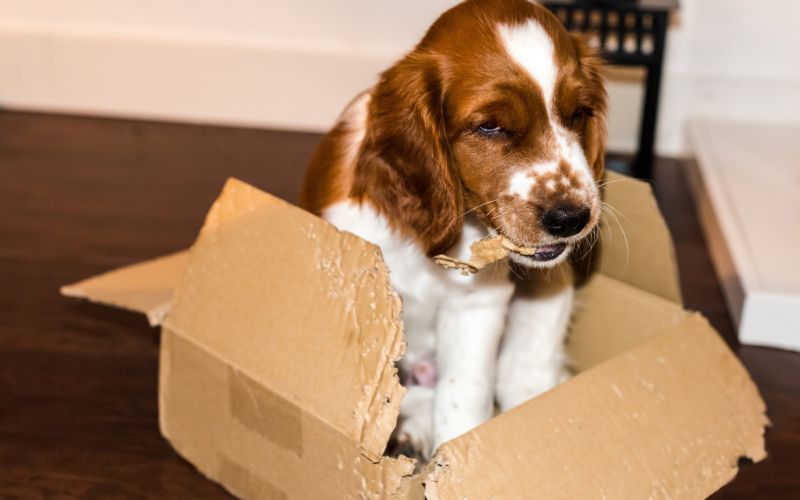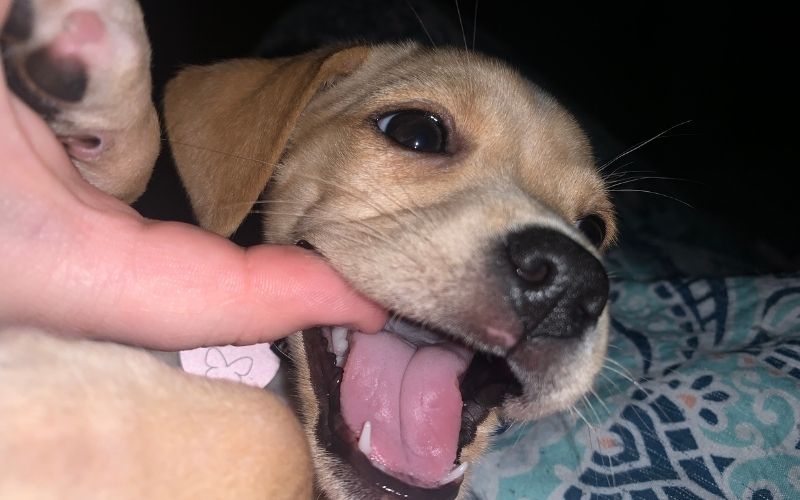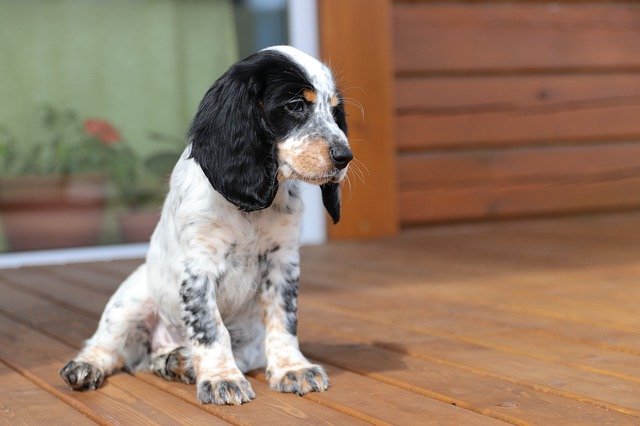All young dogs, including Cocker spaniel puppies will growl and bite as they are growing up and exploring the world.
Biting and growling are natural processes for a Cocker spaniel puppy.
Dogs are oral creatures and puppies learn about their environment by chewing and biting. and interact with others through play which can include growling.
You should discourage your puppy from biting and growling at people when he is playing or exploring. If your puppy nips you then telling him ‘No’ in a firm voice is often enough to stop the biting and this should be repeated until he understands.
Why do Cocker spaniel puppies bite?
Firstly it is important to understand that all puppies nip and bite, it is a natural process and this activity helps the puppy to understand the world that he lives in.
If your puppy is biting, don’t panic – it’s normal and he is healthy.
Biting is common among the young of many species, human babies, for example, put things into their mouths to bite and chew, and this can be a nightmare for many parents.
When your puppy bites it is important to understand that he is not being aggressive, he is simply doing what all young dogs do – exploring.
It is also important to understand that puppies will bite and chew when they are teething and their adult teeth are coming through.
Teething can be painful for puppies and chewing and biting can be a way to help relieve some of the discomfort.
Why do Cocker spaniel puppies growl?
Growling is a normal communication technique for all dogs, puppies included.
Cocker spaniel puppies will growl when they play, and this is quite normal.
When dogs play there is always a purpose and that purpose is generally winning and losing.
Growling is part of that play process.
Puppies will also growl as a warning – generally meaning please leave me alone.
This will often happen when the dog is tired and wants to rest or when he is having his meal and doesn’t want to be disturbed.
You should not confuse growling with aggression in a Cocker spaniel puppy and it is important that you recognise the message that your dog is conveying to you.
Children, in particular, should be taught to respect the puppy and understand that he is not a toy and needs ‘time out’ just like they do.

Problems with puppy biting
Although biting is a natural and normal thing for puppies to do, it is important that your puppy understands that biting people is not allowed.
If he learns, at an early stage that he should not nip or bite, then there is less likelihood of him biting, even in play, when he is an adult.
An adult dog, of any breed can exert a significant amount of pressure if he bites and can cause some bad injuries, thus understanding, as a puppy that biting is not allowed, is important.
Thankfully, Cocker spaniels, and indeed most gun dog breeds are soft mouthed, and it is normally an easy process to teach them to control their bite.
Teach your puppy to control his biting
The teeth of all puppies are like sharp needles and it doesn’t take much for a Cocker spaniel puppy to hurt and inflict injury when he bites with these puppy teeth.
The simply strategy if your puppy does nip is to yelp or tell him ‘no’ in a stern voice and then give him the ‘silent treatment’.
Don’t play with him and perhaps ignore him for a few minutes.
When he has calmed down then he may play with you again.
Keep it on your terms. Make sure that all of the household follow this strategy.
It is important that you and the rest of your family, children included, do not encourage the puppy to bite.
Remember that the puppy does not understand and, if you are playing a rough and tumble game, he will use his teeth to play – because he is just a baby and doesn’t know any better.
So try to keep play times calm and measured.
You can also use some chew toys for your puppy to play with and chew on, so that he doesn’t chomp on your fingers and toes.
If he wants to bite then give him something that he is allowed to bite – one of his toys.
[amazon box=”B0002DGL26,B07HB21T2Y,B00ZFSGJOI” grid=”3″]
Be patient
Owing to his tender age, this will take time and your puppy will probably want to chew you more than his toys.
Don’t become frustrated or angry with the puppy and never, ever smack or punish him, you will only frighten him and he may bite you out of fear.
Simply soldier on and repeat the actions of acting as though he has hurt you, telling him ‘No’ and giving him alternatives to chew on such as his toys.
He will get the message, but you, as the human, need to make the effort to show him what is and what isn’t allowed.
Your aim is to have a puppy, which will grow into an adult dog, that will play, have fun and enjoy being around all types of people and that will not use his teeth to hurt people.
Of course, you cannot predict all circumstances and if your dog is being hurt or maybe you are being hurt, then it is quite possible that your dog will get his weapons out ( his teeth ) and cause damage – but that would be different circumstances which most people would understand ( and possibily tolerate and welcome )
Another way to stop a puppy from biting
I’m going to tell you this way as it does work and I’ve used it myself.
I would suggest that this is only used as a last resort type method and it should only be used on older puppies that are at least 4 months old.
You need to be gentle with this but firm enough to give the puppy the warning.
If your puppy nips then you grab him gently by the scruff of his neck ( the loose skin at the back ) and you give him a gentle ‘scruffing’ – a shake, while at the same time making a gruff, growling type noise and telling him ‘No’.
It is vital that you do not hurt him and that you are not rough or frighten him. You are seeking to ‘inform’ him that he has gone too far and you are not happy.
When he calms down give him one of his toys to play with.
We always end on a positive with any sort of dog training – giving him a toy and playing is a positive.

Puppy biting while teething
Teething is a painful process for to most species.
Humans have an uncanny knack of understanding the discomfort and pain that a human baby goes through when teething and put things in place to help, but seem to lose the plot when dealing with puppies.
Just as your baby wants to chew and you get him a ‘soother’ – your puppy wants to do the same.
If you don’t provide him with something then he’ll chew the sofa, the TV remote, your Armani shoes, the table legs – anything and everything – and, if he does – it’s your fault.
Get him his own things to chew on.
It does not need to be anything exotic and one of the best solutions that I’ve used it to get an old T towel, wet it with water, tie it into a knot and put in the freezer for a few hours.
Once it freezes you have a nice, cold and safe item for your puppy to chew on.
Remember, he is a baby dog – treat him like one.
Often what works for human babies will work for puppies – but DO NOT give him any form of medicines unless your vet has advised that you can.
Final words – how to stop a Cocker spaniel puppy from growling and biting
Understanding why your Cocker spaniel puppy growls and bites is the biggest step in learning and understanding how you can stop him from doing so.
With the techniques outlined above you will be able to stop your puppy from this behaviour and, hopefully you will also have a better understanding of why he does it and the part that you and your family need to take to help him.
I’l repeat – it is vital that you remember that he is just a baby and these behaviours are normal and are not signs of aggression.
It is up to you, as the most intelligent life form on the planet, to learn to understand more about how that little bundle of fun and fur behaves.




